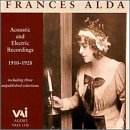| All Artists: Alfredo Catalani, Ermanno Wolf-Ferrari, Giacomo Puccini, Pietro Mascagni, Arrigo Boito, Giuseppe Verdi, Jules Massenet, Victor Herbert, Emmerich Kalman, Liza Lehmann, Cesar Franck, Recorded Sound, Arthur F. Tate, Umberto Giordano, Te Rangi Pai [Princess], Alfred Hill, Nora / Maxwell, Elsa Bayes, Frank La Forge, Frances Alda Title: Frances Alda: Acoustic & Electric Recordings (1910 - 1928) Members Wishing: 0 Total Copies: 0 Label: Video Artists Int'l Release Date: 3/26/1996 Genres: Special Interest, Pop, Classical Styles: Vocal Pop, Opera & Classical Vocal, Historical Periods, Modern, 20th, & 21st Century, Instruments, Electronic Number of Discs: 1 SwapaCD Credits: 1 UPC: 089948112624 |
Search - Alfredo Catalani, Ermanno Wolf-Ferrari, Giacomo Puccini :: Frances Alda: Acoustic & Electric Recordings (1910 - 1928)
 | Alfredo Catalani, Ermanno Wolf-Ferrari, Giacomo Puccini Frances Alda: Acoustic & Electric Recordings (1910 - 1928) Genres: Special Interest, Pop, Classical |
Larger Image |
CD Details |
CD ReviewsOne of the Loveliest Voices of the Met's Turn of the Century Doug - Haydn Fan | California | 06/27/2009 (5 out of 5 stars) "The New Zealander Frances Alda preceded her modern soprano counterpart Kiri Te Kanawa by some sixty years or so. Alda studied in Paris with Marchesi, but generally she should be counted as a purely lyric, rather than a coloratura, the type of singer Marchesi is remembered for turning out. The Harold Wayne Collection, Vol. 25: The Marchesi School Of course, many of Marchesi's students sang the lyric roles supremely well - in those days lyric sopranos were simply expected to sing highly decorated passages as a matter of course. And Alda shared this technical prowess, as her masterful singing of the first selection here, the extremely challenging aria from Catalani's forgotten opera Loreley, totally proves! Just that for the vast majority of these selections you should not be expecting lots of high wire acts, ala a Tetrazzini, but rather lovely lovely lyric singing.
Alda sang for four years at the major European opera houses, beginning with her debut in 1904 in Paris at the Opera-Comique as Manon, having been tutored by composer Massenet. She sang as Gilda opposite Caruso's famous Duke in London, and in 1907 met Toscanini and Gatti-Casazza in Italy, later debuting at La Scala in Charpentier's Louise under the direction of Toscanini in 1908. When the famous pair joined the Met, Alda followed, singing Gilda in December 1908 with a spectacular Rigoletto cast for her debut - Caruso, Amato, Homer, and Didur. Alda married Director of the Metropolitan Gatti-Casazza in 1910, and she sang steadily at the Met all the way through the end of 1929, when she and Gatti-Casazza divorced. One should not think though that Alda owed her place purely to her marriage, her singing was quite good enough on its own! Among some of the young lyrics who moved in and out of the Met at the time were voices as sensational as Edith Mason and Claudia Muzio! The notes consist of five pages of Personal Remembrance of Alda by Aida Favia-Artsay, one of the legends of the world of opera record collecting. Her description of Alda's voice bears quoting; "Alda's voice was a pure lyric soprano of enchanting loveliness, flawlessly clear, and full like an open bloom. Among the many attributes that made her singing the sheer joy that it was, were the firm suppleness of tone, its chaste legato and silky melodic line, and one of the most entrancing trills ever to flow from the human throat. Amd although impeccably correct, Alda's tone was devoid of any cold, mechanical perfection - it was warm and caressing, and it tugged at your heart strings." Despite some nasty comments about Melba's French, most of these major English speaking singers back at the turn of the Twentieth Century, such as Alda, Farrar, or Eames, worked diligently at their pronunciation, and sang in such a way you can clearly hear the words. The audience didn't fall back on supertitles then! There is also an excellent detailing of each of the recording dates, etc. These selections showcase many of Alda's quintessential roles. All of the selections derive from perfect original copies supplied by noted vocal recordings dealer Larry Holdridge. For Met history buffs and lovers of past sopranos, this Cd offering presents a rare chance. The full listing of samples should make the decision pretty easy. There was for a time a Romophone offering of Alda, it has now been discontinued. If you can find it at a good price used grab it! Frances Alda: The Complete Victor Recordings, 1909-15 There are also assorted examples of Alda in the Nimbus series. Fans of opera anecdotes will find Alda's memoirs manna from heaven. Men, Women And Tenors " |
